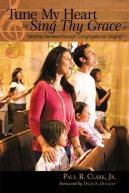 Are any of you concerned as I am about the state of singing in corporate worship in many churches. As noted in my book, there are different gatherings for Christian worship besides the local congregation, but this address is aimed toward the local body and its weekly worship gatherings. I am old enough to call it congregational singing, and am concerned at what I see and hear in many church environments in relation to this foundational activity. I have been concerned for some time, and have attempted through numerous means to help bolster congregational singing as I believe it to be a critical aspect of worship renewal and also a reflection of the depth to which our worship has been and is being regularly refreshed. I have come to a conclusion, and I simply must share. It is profound.
Are any of you concerned as I am about the state of singing in corporate worship in many churches. As noted in my book, there are different gatherings for Christian worship besides the local congregation, but this address is aimed toward the local body and its weekly worship gatherings. I am old enough to call it congregational singing, and am concerned at what I see and hear in many church environments in relation to this foundational activity. I have been concerned for some time, and have attempted through numerous means to help bolster congregational singing as I believe it to be a critical aspect of worship renewal and also a reflection of the depth to which our worship has been and is being regularly refreshed. I have come to a conclusion, and I simply must share. It is profound.
Are you ready for this? I have concluded that there are at least two ingredients needed for congregational singing in worship and they are……(drumroll with crescendo, decrescendo, crescendo….. to extend the dramatic impact) as follows.
- First you need a congregation. That’s right, you need a congregation to have congregational singing in worship. Although it sounds ridiculously obvious to mention, the fact is that a lot of congregation’s have relinquished their responsibility in worship singing through various means starting with simply choosing to not be present for corporate worship. The New Testament Greek word for church is Part of what it means to be ekklesia, “the called out ones,” is to gather forming the worshiping body. Scholars tell us that, like the Hebrew word, quahal, that one of its clear meanings is assembly. Wayne Gruden says “We can understand the purposes of the church in terms of ministry to God, ministry to believers, and ministry to the world.”[1] Ministry to God includes singing to Him, for Him, and about Him. The Apostle Paul follows his admonition to “make the best use of the time” (Eph 5:16) with his exhortation to be filled with the Spirit and to be “singing and making melody to the Lord with all your heart.” (vs. 19) If you aren’t present as congregation you cannot add to the worship singing. Have you ever noticed that churches build worship spaces to seat about half of their church membership? What does that say? I recognize some growing congregations meet in multiple services to accommodate the worshiping crowd using the same space multiple times, but many more simply have no expectation that any more than half the congregation will be together on a given Sunday. I fear that our pragmatist marketing attempts to attract non-attenders and make worship all about them, coupled with the fierce individualism that is a hallmark of present day attitudes have served to make consumers of spiritual buzz, and not disciples of Jesus Christ. Scripture does not separate coming to Christ from becoming part of His Bride. Participation in the assembly as an act of our discipleship is a given. (Hebrews 10:25)
- The second ingredient needed is singing. A packed house is a packed house and it has the potential in and of itself to inspire leaders and members. If, however, the full room never translates into the sights and sounds of worshiping people engaged with head and heart in biblical worship singing, then what do we have but a crowd of spectators? Again, seems leaders may be getting what they expect. Now, on this point I have to agree wholeheartedly with several of my colleagues who have joined in addressing numerous issues that thwart singing participation by the congregation (see links below). I wonder, though, just how much leaders actually allow, indeed expect, members to hold up the sounds of singing. This is noted as well in some of the links, but I want to underscore the need. It is far too easy for Worship Music Leaders to just make the music for them (the congregation). It is much more comfortable than taking the risk of assured discomfort in the momentary anemic sound of people not doing what is asked of them. However, in order to call the congregation to its responsibility of admonishing one another with psalms, hymns, and spiritual songs, it is my contention, they simply must feel the weight of that responsibility. Dropping the props and handing them the proverbial ball actually works. I have tried this often. It is disturbingly uncomfortable and awkward – until, that is, members begin to feel that discomfort enough to fill in the void with their own vocalization. I can testify that this CAN be done. We did not lull them into a couch potato mindset overnight and they are not likely to bounce out of it in an instant either, but give patient but firm and steady leadership and you may once again hear the pews alive with sounds of singing. Consider:
Do you and your people even know what it sounds like for them to be fully invested in singing?
Do they know what it feels like to sing in such a way that they sense their individual voice within the whole composite sound of corporate singing done by their own congregation?
In other words, do they know what we are aiming toward? Hopefully leaders know what you want your choir, band, or praise group to sound like musically. What about your congregation? Do you know? Do they know? Do all members of your choir, band, praise group, sound man, and/or senior pastor know what sound we are listening for when the congregation is singing? *This, I believe to be a starting point in the matrix of change toward giving the congregation back its song. A first clue for me is when platform players and singers want more of themselves in the monitor. Wha????? We need less of me and more of us!
If your worship singing needs a tuneup, how about starting by evaluating the two most basic ingredients needed for congregational singing? A gathered congregation, and participatory singing.
Links mentioned above:
They Are Not Singing Anymore by Mike Harland
Is Your Church Singing? Send in a Canary! By David Manner
Nine Reasons Your Congregation Won’t Sing by Kenny Lamm
How Loud the Worship Team? By Bob Kauflin
[1] Wayne Gruden, Systematic Theology : An Introduction to Biblical Doctrine (Zondervan 1994) 867.









